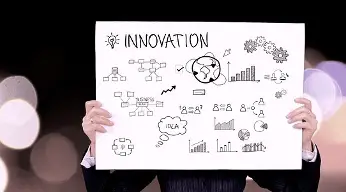What is the role of innovation in furthering education and vice-versa? The author reflects on current technological development and how this influenced man’s acquisition of knowledge and outcomes arising from application of derived innovations. Shall we tread on in our chosen path?
The society we are in at present is a product of evolved responses made by man through years of history. Human society, as we know it, originally consisted of a few people interacting with each other and its environment primarily to meet their basic needs for survival.
From the mere preoccupation with activities to satisfy a hungry stomach as in the early hunting and gathering stage where humans live a nomadic life, man progressed toward achieving self-sufficiency with lesser effort. Agricultural production with the aid of technology developed into a complex system as it is now. Crude, human-powered technologies advanced into mechanized or automated modes, thus increasing production to such levels so as to supply an increasing demand brought by a growing human population.
What caused these changes?
If we look closely, the primary motivation to achieve such changes comes from within the individuals that compose society. The desire to improve one’s plight spurs creativity. An idea to resolve a problem situation can motivate individuals to undertake significant steps to do better than status quo. These new ideas that get something done are what we usually call innovations.

The Role of Innovations in Society
Innovations could change the direction the society takes. Moreover, innovations are shaped by stored knowledge provided by education or experience.
It is a known fact that education plays a great role in society’s development. In recent times, this has become very vital considering the fast pace of change accorded by the deluge of information provided by technology that connects thoughts from all over the world using computers.
We cannot discount the fact that information technology has influenced the way people build societies. It is now possible to exchange information in almost all corners of the world, even those areas that were previously thought to be isolated.
Schools, therefore, should not ignore this fact and subscribe itself to keep pace with changing times. Soon, physical presence may no longer be required in the exchange of information between mentor and students. Schools no longer monopolize the dissemination of knowledge. Knowledge pervades all nooks and crannies of any country through internet technology.
It is for this fact that serious attention must be given by schools, as a primary agent of change in society, to the quality of education imparted to the masses. The development path pursued by current education appears to be towards man’s undoing. The more our society progresses, the more problems that crop up. New technologies bring with it externalities that undermine the advances made.
Satisfying wants and achieving conveniences in living cause pollution, not only on the physical dimension but also on people’s values in life or morality. Almost always, increased crime rate is equated with development or urbanization.
Finally, as an empowering resource to individuals, knowledge through education should be provided in such a way that no area of human life is left unfulfilled. Focus must be on the individual’s, and thus, society’s total development. The ultimate goal is still there — to ensure human survival.
©2015 September 10 P. A. Regoniel
[cite]




Hi PATRICK,
This article is great and the arrangement of the information is very good thus making it much easier to understand. This is very true, we/humans start to further develop our knowledge step by step because of the changes that happened and the urge to find ways to survive as the years flew by. We became smarter and developed many things to help us in our daily lives and to ensure our survival. Now our primary weapon for survival is knowledge through experience and education that are vital to further develop our knowledge.
Thanks for sharing this great article and information, You Nailed it sir.
-Nile
Welcome Nile. Thank you for reading the articles. These are just some of the things we need to reflect on as education is no longer bound in the four corners of the classroom.